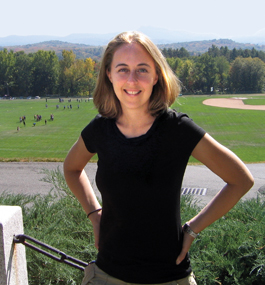Reading, Writing and Race

by Theresa Pease
When Hilary J. Moss, M.A., Ph.D.’04, arrived at Brandeis with a B.A. in U.S. history and English literature from Northwestern, she knew she wanted to immerse herself in our nation’s past. She just didn’t know what aspect of history would engage her.
Then her Brandeis adviser, the MacArthur award-winning scholar Jackie Jones, mentioned the tensions surrounding the education of free and enslaved African-Americans before the Civil War. “Jackie had this way of planting ideas in your mind in a way that made you think they were your own,” says Moss, now assistant professor of history and black studies at Amherst College in Massachusetts. “Although I hadn’t set out to specialize in African-American history, I was always interested in issues of inclusion, exclusion and equality, and, in American history, race seems to be at the meeting point of those issues.”
To inform her research, the Washington, D.C., native looked principally at three cities: Baltimore, New Haven and Boston. The stories she unearthed provided fodder not only for her dissertation, but also for her first book, “Schooling Citizens: The Struggle for African American Education in Antebellum America,” published by the University of Chicago Press early this year.
As Moss began to examine early-19th-century public and private experiments in educating African-Americans, she became fascinated by the backlash that erupted against those efforts just at a point in time when many advocates were beginning to call for the creation of public school systems.
Fueling the cry for public schools were two arguments. “The first,” Moss says, “is that public schools would take individuals with different religious beliefs, backgrounds, and ethnicities and create an inclusive, collective American identity. The second was the creation of a productive labor pool with good work habits and basic literacy skills. If we wanted our economy to grow, then public schools would be an important engine of industrialization.”
Some proponents of black schooling added a third rationale: Educated blacks could lead their companions back to Africa as missionaries and teachers.
Opponents feared educated slaves would rise up, demand equal treatment, and perhaps even kill their masters. And the argument for inclusion was hardly compelling to those whose personal goal was exclusion. Further, preparing African-Americans for the workplace seemed self-defeating to those who feared literate blacks would edge them out of their jobs by providing a cheap source of labor competition.
Some of Moss’ discoveries surprised even her. She was amazed, for instance, to learn Baltimore had flourishing, publicly advertised black self-schools even while in Virginia, just a few miles away, teaching African-Americans to read and write was a punishable crime.
“I think the biggest surprise for me,” she says, “was the realization that the impulse to exclude African-Americans from educational access was just as strong in the North as in the South. Even in Boston, which was considered a center of learning and opportunity, there was very vocal opposition.”
